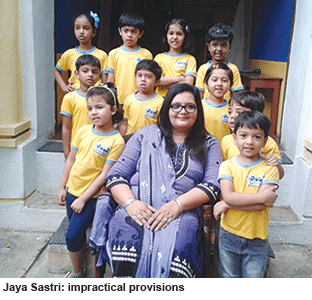 It was too good to last. The sole preserve in the education continuum — early childhood care and education (ECCE) — which had escaped the heavy regulatory hand of government for over six decades, has lost its independence.
It was too good to last. The sole preserve in the education continuum — early childhood care and education (ECCE) — which had escaped the heavy regulatory hand of government for over six decades, has lost its independence.
On June 12, the Jayalalithaa-led AIADMK government of Tamil Nadu (pop.72 million) promulgated post-independence India’s first draft code of regulations for the state’s 11,300 playschools (aka pre-primaries/preschools). Six weeks later, after perusing suggestions from the public, it published a revised draft on July 20.
According to the revised draft, a playschool is defined as a pre-kindergarten established for providing informal education to children in the age group 1.5-5.5. It requires the ownership of all preschools to vest in a not-for-profit trust or society and mandates extant pre-primaries to apply for recognition from the district elementary educational officer, and renew the approval every three years.
The draft also prescribes two entrances in every classroom for safety reasons, adequate number of toilets, potable drinking water and a play area. Other important regulations: schools should restrict admission to children residing within a 1 km radius; no child should be subjected to an admission test; school timings should be between 9.30 a.m and 12.30 p.m; and the ECCE curriculum and pedagogy should ensure all-round development of children in joyful, enabling environments.
“By and large, the revised draft has prescribed international best practices for regulation of pre-primaries and stresses the importance of safety and hygiene which are prime prerequisites. However, some provisions like two exits in all classrooms; lease agreements for a minimum five years and restricting admissions to children residing within a 1 km radius are impractical, and we hope to get them modified,” says Jaya Sastri, founder-director of the top-ranked (#3 in the EW India Preschool Rankings 2014) SEED (School for Enrichment and Development in Education), Chennai.
Three weeks after the school education department published the draft code of regulations for playschools, it also presented an activity-oriented syllabus for children aged 1.5-3.5 years and a three-hour time-table which includes ‘circle time’ during which children talk about themselves and tell stories; free play for brain building; theme-based activities for every month of the year; music, dance, art and outdoor play sessions and toilet-training.
However, there’s rising criticism of the lacunae in the hastily revised draft and proposed syllabus for early learners from within the country’s ECCE providers. “The definition of playschools should be changed to include day care centres and creches for children from the age of six weeks to 3.5 years to accommodate working mothers. Moreover, the draft syllabus and timetable proposed by the state government lacks flexibility and is not suitable for little children with short attention spans,” says Dr. K. Shanmugavelayutham, convenor, TN-FORCES (Tamil Nadu Forum for Creche and Childcare Services).
Adds a preschool chain promoter who spoke to EducationWorld on condition of anonymity: “Undoubtedly there is a need for broad guidelines to be prescribed for the regulation of pre-primaries because the conditions in which children are confined in some so-called preschools are appalling. However, the detailed prescription — two exits, five-year lease and 1 km residence rules — and detailed syllabus is a charter for harassment and extortion of preschool managements by the education ministry’s notorious school inspectors. The history of primary and secondary schools in Tamil Nadu in which government over-regulation and extortion is routine, is likely to be repeated in preschool education.”
Unsurprisingly, the detailed draft regulations drawn up for private pre-primaries are not applicable to the state’s estimated 50,000 anganwadis (child and lactating mothers’ nutrition and education centres) established by the Central government under the Integrated Child Development Services (ICDS) programme, and run jointly with the state government. Despite the mandate of the National Early Childhood Care and Education (NECCE) policy draft drawn up by the Congress-led UPA-II government and awaiting the approval of the BJP/NDA government, to upgrade anganwadis into full-fledged pre-primaries/playschools, the state government’s draft makes no reference to NECCE or anganwadis.
Quite clearly, the prime intent of the state education ministry is to ‘regulate’ private pre-primaries — an initiative with numerous benefits for them — rather than make high quality ECCE available to the great majority of Tamil Nadu’s 6.8 million infants in the 0-5 age group.
Hemalatha Raghupathi (Chennai)